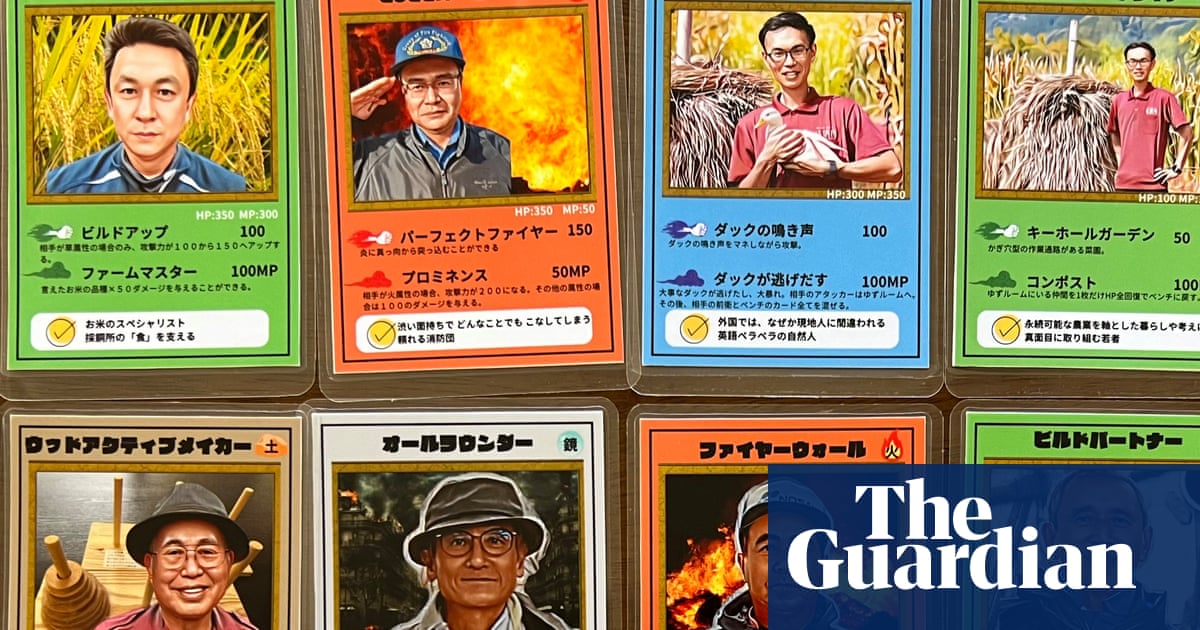On the day before the new school year starts, four boys armed with plastic cases filled with cards are squeezing in a game at a community centre in Kawara, a small town in south-westJapan.
Like millions of children around the world, they are obsessed with trading cards. But they’re not wielding Top Trumps, Pokemon, superheroes or sports stars.
Instead, the faces on the cards belong to real people – local men over a certain age whose competing professional qualities determine the outcome of each game. There is Hiroyuki Fukushima, a former train driver; Fumiaki Kawai, a retired robotics expert; and even Kawara’s mayor, Shigekazu Tsuruga.
They have all become unlikely local heroes, thanks to the “OjisanTrading Card Game”, which began as a fun distraction but is now an inspiration for other dwindling rural communities in Japan.Ojisanmeans uncle or middle-aged man.
“It feels great when you win, but it’s even more fun when you use a card featuring someone you actually know,” says 12-year-old Sasuke, who plays about three times a week.
The team behind the game are taken aback by the attention. “We’ve had visitors from Holland and Czech Republic, who came just to see the cards and buy a starter pack,” says Yuki Murakami, a town official.
“We made the cards so local kids and older people would get together. We think it’s been a success. Children are really good at remembering faces, and they’ve even persuaded some of the shyer adults to become characters.”
Neighbouring communities are about to launch their own versions, while trading cards have appeared in other parts of Japan, including one featuring local fishermen.
“Not many people knew of Kawara, but that has changed thanks to the card game,” says Tsuruga. “It’s true we have a depopulation problem, so if the game gets people to come here, who knows, some might even decide to live here. Above all, it’s done wonders for the psychology of the town.”
The cast of 22 characters, some of whom appear on more than one card, includes Mr Honda, the former head of the local fire brigade who is skilled in first aid and rescue work; soba chef Mr Takeshita, who teaches noodle-making classes; Mr Kitamura, who has never encountered a broken electrical appliance he can’t fix; and Mr Fujii, a former prison correctional officer who now works as a volunteer driver for older residents.
Each card carries “hit points” and “magic points”, with the owner of the most cards at the end of a game declared the winner.
Eri Miyahara, secretary general of a local community council, came up with the idea of using collectible cards to bring the community together after noticing how little social interaction there was between children and older people.
“I thought the card game was a fun way to introduce people to each other,” says Miyahara. “The kids read the cards very carefully and seem to remember each character’s qualities right away.”
Initially intended as collectibles, the cards were turned into Pokemon-style trading cards at the urging of children who saw the competitive potential behind their disarmingly analogue pastime.
When theojisancards appeared in late 2023, Kawara was battling the same challenges faced by other rural communities – an ageing, shrinking population that was losing its sense of cohesion.
Kawara’s population peaked at about 19,000 after the second world war, but has since fallen below 10,000. More than 40% of the population are aged 65 or over. Its four primary schools and two middle schools are now under the same roof, with a total of just 220 pupils.
“I used a photo of each person and gave them the anime treatment, so they all look a bit like AI versions of themselves,” says Hiroe Nishiu, the cards’ designer. She made an initial batch of 100 cards, but can barely keep up with demand.
Kawai, a retired employee of a robotics firm who can build just about anything once he puts his mind to it, is among the unlikely cast of Kawara heroes.
“I was asked to provide a photo, but I had no idea about how I’d look on a card game,” says Kawai. “Now I come across kids and hear them say, ‘Oh look, there’s that guy on the trading cards.’ It’s made it much easier for everyone to communicate … it was nothing like that before the game appeared.”
Hiroyuki Fukushima, a former train driver who does volunteer work, is similarly nonplussed by his unlikely celebrity status. “When I saw the cards for the first time, I have to admit I was a bit embarrassed,” he says. “I still feel that way. People even come up to me to ask for my autograph.”
The game has been a success. Locals say more children are involved in community activities, and the invisible barriers between the generations are beginning to come down.
“Take Kawai-san,” says Miyahara. “He’s done lots of amazing things with robots, but no one knew.”
Kawai, Fukushima and Shinya Mimura, a multitalented member of the town council who appears on no fewer than six different cards, joke that the game has spawned friendly rivalries, even though the game itself tries to be as egalitarian as it is competitive.
“It’s not like one character is dramatically stronger than the others,” says Miyahara. “And all of them are all alive and well, so unlike other trading games, they don’t ‘die’ when they lose. That would be way too dark.”
Instead, defeated characters take a break in the Yuzu Room – the nickname for the old primary school nurse’s office – where they remain until the end of the game.
Eitaro, 10, pronounces the localojisanheroes the “best” trading card game he’s ever played. “The rules are easy to understand,” he says. “But, best of all, it’s something you can only play here in Kawara.”
